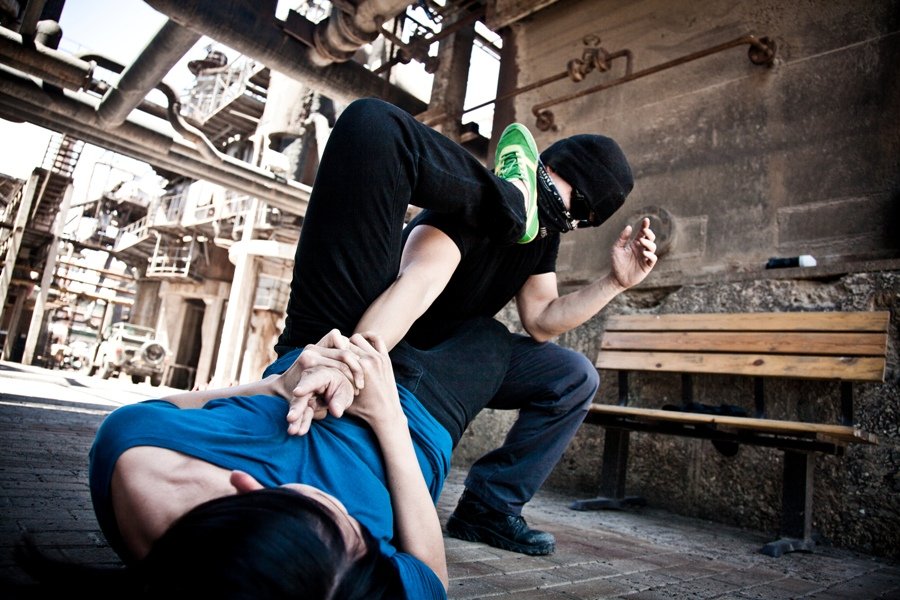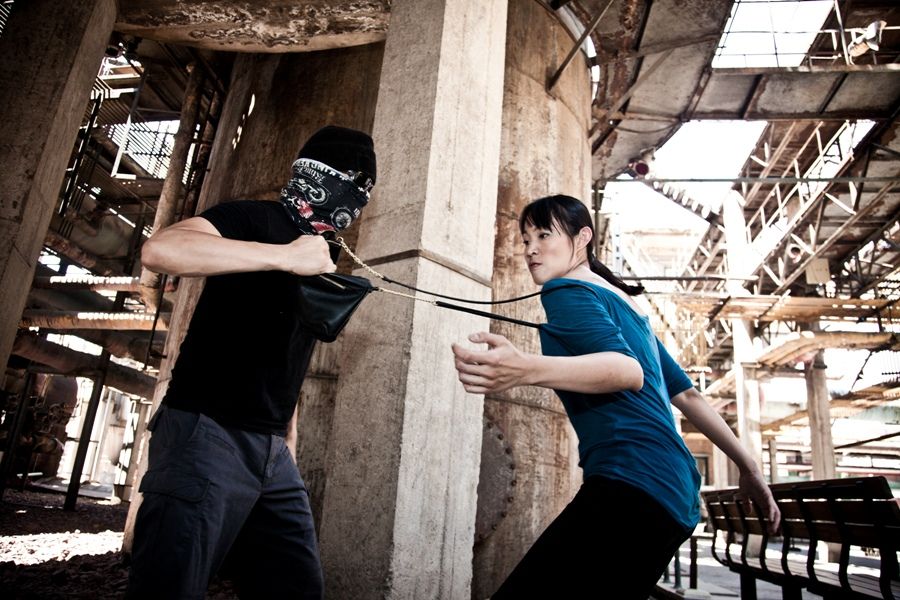Defend Yourself: A Violent Incident Highlights the Need for Situational Awareness
Editor's note: When this article first ran in the Beijinger in June, the "violent incident" referred to in the headline was a non-lethal assault. Tragically, this past week saw the murder of a Chinese woman in Sanlitun by a sword-wielding attacker and slashing of her French husband. As such, we are presenting this article on self-defense again, in hopes that its lessons may be helpful in protecting our readers against future possible incidents.
Sophia Pederson still says that Beijing is a safe city. But she didn’t feel so secure in the capital’s taxis earlier this year, after being attacked by not one, but two cabbies in the span of a few short weeks.
The first incident occurred just before Spring Festival, when Pederson and a female colleague decided to split a cab after a staff outing at the nightclubs near Workers’ Stadium. The cabbie drove for three minutes, and then suddenly hit the meter and told Pederson and her friend to get out.
“We’d had a few drinks, and we were chatting in English in the backseat, but weren’t loud or obnoxious,” Pederson recalls. She politely insisted they keep going (because, as most of us know, it is difficult to find a taxi in the Sanlitun area). The driver got out, opened Pederson’s door and hauled her out of the backseat so roughly that she fell to the ground. She cursed at him in Chinese, and the cabbie threw her against the car, saying: “If you weren’t a woman, I’d kill you.” His threat enraged her, and she dared him to try. Pederson’s colleague snapped a photo of the car’s license plate with her phone, and the cabbie eventually got back in and sped off.
Pederson called a Chinese friend for help, who took her to the nearest police station to file a report. The driver was eventually brought into custody and Pederson sorted out a settlement of RMB 3,000 with him. “I didn’t care about the money,” she says. “But I wanted to let him know that what happened wasn’t okay.”
Two weeks later, a still-shaken Pederson boarded another cab, once again in the Sanlitun area. When the driver took an unexpected right turn she repeatedly asked why, but he refused to answer, prompting her to hop out during a traffic jam. He pulled over and shouted after her to pay the fare, then followed her and even tried to grab her purse. Fortunately, a couple passing by intervened, leading Pederson away before the cabbie sped off.

Pederson admits that she could have avoided risk by ceding to the drivers’ demands. However, she insists that passengers should be able to respectfully question cabbies without them becoming confrontational. “I was being wronged, and if I really felt like I was in danger. I would’ve just given the second driver the fare,” she says. She adds that complying with such demands may not be enough to cease some drivers’ hostility, and that passengers should further protect themselves if the cabbie becomes aggressive by photographing the license plate or his dashboard license display. That should be enough to deter the driver, who knows that such information can be used in a complaint. Pederson also encourages victims to file grievances on the cab company’s complaint line. She has also considered enrolling in a self-defense course, in order to ward off assailants enough to make an escape.
Such tactics are the cornerstone of the courses at KMG China, which offers an annual beginner women’s program and more advanced co-ed classes in the Israeli Krav Maga Global self defense training program, which is also used by the Israeli military (the beginner women’s course wrapped up in May, but newbies can join the more advanced classes anytime, where instructors provide special support to help them catch up). The classes focus heavily on “de-escalation” tips and teach students many methods to assertively talk their way out of confrontations. However, KMG China General Manager Yonina Chan (who is also a well-versed student in the discipline) says participants also must learn how to deflect attacks and effectively strike back, so as to subdue their assailant enough to make a safe getaway.
For instance Von Ng, the head instructor (and Chan’s husband), teaches students how to hit with an open palm, so that they don’t sprain their wrists by punching with their fists, or to kick from the hip, angling their feet and joints in such a way that they reach their greatest potential strength while striking.
“Some students are very timid and even uncomfortable hitting a pad,” he says, adding that that changes within the span of a few classes, by which time even the most petite female students can break free of an attacker many times their size.
Chan says Krav Maga also prompts students to confront misogyny, saying: “Some of our Chinese female students say they’ll never tell anyone that they’re taking these classes because, ‘It’s just not something that women do in China.’ I think that’s changing, but very, very slowly.”

That change in attitude occurred much more quickly for Carmen Huang, a Chinese KMG student. At first she found herself winded and intimidated by the drills, but within a year and a half she had dropped eight kilos, could subdue towering male students, and found herself calmer and more confident in everyday life. But she understands why some Chinese women are squeamish about the course, saying: “They’re afraid to be seen as a nv hanzi (女汉子), or a manly woman. In the traditional Chinese mindset, a girl should be weak and dependant on her husband. But just as more women are working as leaders in companies, taking responsibility for your safety should be normal.”
That responsibility extends to psychological well-being, says Liu Fengqin, a counselor at Hong Feng Women’s Support Center, Liu helps women wrestle with a host of issues that assail their psyches. After seeing the police and visiting the hospital, Liu insists that attacked women also talk to a psychologist or a counselor. She notes that Beijing’s international hospitals have highly qualified psychologists, and adds that Hong Feng has a free hotline with certified counselors on call.
“It’s very important to get psychological help in these situations because emotional pain is deeper and lasts longer than any physical injury,” Liu says, adding: “It can make victims fear contact with people. And when women keep quiet about those struggles, it hurts our society as a whole.”
Learn more at www.kravmagaglobal.com.cn.
Photos courtesy of KMG China
Related stories :
Comments
New comments are displayed first.Comments
![]() Brian Bare
Submitted by Guest on Mon, 08/17/2015 - 21:01 Permalink
Brian Bare
Submitted by Guest on Mon, 08/17/2015 - 21:01 Permalink
Re: Defend Yourself: A Violent Incident Highlights the Need...
Many thanks for the response and clarification… didn't mean to be so cranky.
I do understand that striking the right balance between an article's timeliness and showing respect / sensitivity to the victims is high art. My advice (not that you are looking for it), is that it’s probably best to err on the side of extreme caution in cases like this.
![]() tomarnstein
Submitted by Guest on Mon, 08/17/2015 - 16:35 Permalink
tomarnstein
Submitted by Guest on Mon, 08/17/2015 - 16:35 Permalink
Re: Defend Yourself: A Violent Incident Highlights the Need...
Apologies for any confusion, Brian, the "Featured" tag is automatically placed on all posts featured in our front page scrolling blog section, except those that are "Sponsored"/paid for. We are working to remove it so as not to avoid a misunderstanding like this in the future.
Krav Maga did not sponsor the blog post or request it be reposted, we just thought it appropriate to highlight steps that may help others when they find themselves in trouble, as admin said above.
![]() admin
Submitted by Guest on Mon, 08/17/2015 - 09:31 Permalink
admin
Submitted by Guest on Mon, 08/17/2015 - 09:31 Permalink
Re: Defend Yourself: A Violent Incident Highlights the Need...
I agree that this sort of defense wouldn't be useful vs a samurai sword-wielding maniac. But its fairly rare that someone has a meter-long sword. The incident's proximity to Sanlitun reminds us of many a fight that has happened in the area in the past.
I don't think it's a bad idea to suggest to people at this time that preparing yourself for self-defense makes sense.
![]() bjreddragon
Submitted by Guest on Sun, 08/16/2015 - 14:30 Permalink
bjreddragon
Submitted by Guest on Sun, 08/16/2015 - 14:30 Permalink
Re: Defend Yourself: A Violent Incident Highlights the Need...
Yeah, um, not sure if there is a proper defense strategy when the attacker has a meter long sword and attacks from behind. A new low for The Bejinger.
![]() Brian Bare
Submitted by Guest on Sun, 08/16/2015 - 14:05 Permalink
Brian Bare
Submitted by Guest on Sun, 08/16/2015 - 14:05 Permalink
Re: Defend Yourself: A Violent Incident Highlights the Need...
Way, way, way too soon for this "featured" article... and you damn well know it. Why even bother with the Editor's note / disclaimer / justification? Of course editorial decisions can be tough to make at times, but the timing of this "featured" article reeks of greedy opportunism. And its a reprint, to boot!
I’m a big fan of The Beijinger, and apologize if my cynicism is unfounded. But seriously, now … so soon?
Validate your mobile phone number to post comments.







